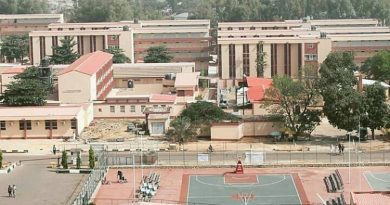Mainstreaming Nigerian Youths into the Petroleum Industry Bill – PIB
By Dr Aminu Abdullahi Isyaku
The discovery of oil in commercial quantities in Nigeria’s Niger Delta region since 1956 has no doubt brought in more revenue flow into the country with the attendant national development witnessed so far.
However, this positive development is often marred by violent youth militancy and local community agitations, which often led to loss of lives and livelihoods, destruction of the oil and gas infrastructure and consequent loss of government revenue, environmental damages and insecurity.

Recently, the Senior Special Assistant to the President on Youths and Students Affairs, Hon. Nasir Sa’idu Adhama has developed a framework for mainstreaming the youths into the Petroleum Industry Bill (PIB) and has been reaching out to stakeholders to address the interests of the Nigerian youths in the Bill in order to realise President Muhammadu Buhari’s vision for the youths in the new bill currently under consideration by the National Assembly.
READ ALSO: ABU Zaria to become a leading Oil And Gas Exploration Research And Training Hub
From inception, consultations and negotiations on the Petroleum Industry Bill. (PIB) is obviously dominated by successive Governments, Community Chieftains and the international oil companies and there were no systematic mechanisms in place for proper consultation of the youths in the host communities and nationwide on the oil and gas issues in an on-going basis.
A broad based stakeholder engagement would help the youths understand both their direct benefits and roles in the oil and gas issues, as well as their level of participation in decision making.
This will also help government to manage the youths expectations by making them into stakeholders in the oil and gas governance structure, as well as in management of the oil and gas investments in their locality.
Consequently, the experiences of the challenges of youth restiveness in the Niger Delta can properly inform all stakeholders, as new discoveries of oil and gas in the new frontiers are currently developed and similar potential youth challenges in the inland basin community areas in the North can be integrally addressed in the new Petroleum Industry Bill.
It is difficult for leaders to simply assume the views and expectations of young people who would be future direct beneficiaries or victims of the decisions on oil and gas issues being made today that excludes them. Such decisions should be guided by empirical research arising from nationwide consultations and engagement with the youth themselves.
The discovery of new oil and gas reserves or increased revenue from the oil and gas in itself does not automatically translate into development. Instead, it is the inclusive strategies involved in the management framework and policy decisions of government. Such decisions should be guided by empirical research to determine the needs and expectations of the youth in Nigeria.
It is obvious that the youths and students in Nigeria have higher expectations that oil and gas revenue should be an opportunity to develop the human capital, local communities and the country at large to achieve higher living standards and government is already doing a lot in that respect.
However, the PIB must not focus on increasing government revenues alone, the bill should translate into: youth economic empowerment, youth inclusion in oil and gas governance, more jobs, better local infrastructure and education and training, community health care, improving local agricultural practices, national savings and investment for future generations.
The “Youth Bulge” in Nigeria represents both a challenge and an opportunity for development. The youths are definitely interested in the “Black Gold”, from the policy and law making process through to who operates or invests in the sector, accountability and governance issues, to how the industry can benefit everyone in the country.
The Niger Delta experience, must not be replicated in the Northern inland basins, as one would expect the communities immediately affected by the exploration and production process should be heavily involved in mobilisation and dissemination of information that will enable them to better appreciate the industry.
To achieve the full objectives of the PIB, a shift in working with the youths as partners, assets, advisors, colleagues and stakeholders is crucial.
Young people’s participation must be far more than gathering their views in surveys or listening to limited numbers of formal consultation and dialogue, to genuinely representing a body of opinion and experience, where young people progress to greater rights and responsibilities from being the targets of outreach, to being actively engaged in the planning and implementation of the PIB process.
Whilst formal consultation and dialogue may be the most visible form of youth participation, there is a range of less visible, but no less important forms, which involve young people as beneficiaries, partners and leaders at an operational level in the PIB making process.
Sustainable youths participation is about Information-sharing, Consultation, Decision-making and Initiating action. As such, we can commit to a Mainstreaming Approach, whereby young people are targeted and engaged within the organisational development, policy and planning, implementation and monitoring and evaluation of the PIB.
Some Organisational Framework required for mainstreaming the youth into the PIB include: Working with youth networks Including; Youth organisations, Student associations, Independent youths, Civil society organisations (non-religious), Youth affiliated NGOs.
Working with youth on PIB Committees is another way to overcome inclusion barriers and engage young people on the decision-making. In this way colleagues and partners will see first-hand the positive contributions that young people can make.
Working with young people in professional roles will enable young people to fully contribute to the PIB, it is important to move beyond engaging youths in short term/unpaid basis and consider more permanent professional roles that they can play. Young people are innovative and creative in problem solving and solution finding and are key to helping communities meet their expectation needs.
Passing and implementing the Petroleum Industry Bill will hopefully soon deliver a new operational regime in the Nigeria’s Oil and Gas Industry.
With the experiences of youth agitations in the Niger Delta and the seemingly similar build-up of expectations of the youth in the Northern inland basins, proper mainstreaming of the youths in such policy framework will in the future prevent local community agitations, which often led to loss of lives and livelihoods, disruptions in oil and gas operations and loss of government revenue.
Aminu Abdullahi Isyaku, PhD is the Geology Departmental Sub-Committee Chairman for the new NNPC Centre for Inland Basin Research and Exploration at Ahmadu Bello University Zaria.
For Advert Placement, Sponsorship, support, Article submission, suggestion, etc, Contact us: info@theabusites.com, +2349015751816 (WhatsApp)








